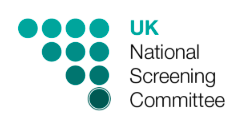October and November 2022 BSTG meeting notes
Published 23 January 2023
The UK NSC blood spot task group (BSTG) held its second and third meetings in October and November 2022.
1. October 2022 facilitated workshop
The October meeting consisted of a facilitated workshop for members to give in-depth feedback on the group’s membership, remit and priorities. Consensus was reached on some key points, including the importance of:
-
considering how patient and public experience evidence can be productively incorporated into the UK NSC process for evaluating rare disease topics
-
developing work to describe how disease registries, data linkages and improved data coding could help provide evidence on rare disease outcomes
-
strengthening the use and understanding of international research
-
keeping in mind the potential harms of expanding the newborn blood spot (NBS) screening programme
All the feedback was considered by the secretariat when updating the BSTG terms of reference which were presented to the November meeting for approval.
Members made only a few minor edits before signing off the terms of reference. They agreed to maintain the group’s current membership but to keep it under regular review. They also agreed that additional experts could be invited to join the group as and when required to work on specific relevant projects.
2. November 2022 meeting
The BSTG was updated in November on several ongoing projects.
Members’ comments were addressed in the protocol relating to the development of practical recommendations for diagnostic accuracy studies in very rare disease settings which has now been published on Open Science Framework. See Research protocol: Development of practical recommendations for diagnostic accuracy studies for very rare and ultra-rare conditions for consideration in newborn blood spot screening programmes.
The group also heard that the project to develop a methodological paper on decision analytic models for newborn blood spot screening is ready to be commissioned once procurement is possible.
The first working draft of a paper comparing the European Organisation for Rare Diseases (EURORDIS) key principles for newborn screening and UK decision making and implementation practices was shared with members and discussed in depth.
Members were asked if they thought the basic messages in the manuscript were correct and if they had any other issues to raise. They were given a further 2 weeks in which to send any additional comments and suggestions that will inform an updated version of the paper.
The group also discussed a future project that will look at how disease registries, data linkages and improved data coding could help provide evidence on rare disease outcomes and other metrics.
This work has not yet been fully scoped, but members provided important feedback that will inform its direction. They stressed that the project should not just focus on registries as repositories of data, but also on outcomes and the need to follow up outcomes to assess if screening is viable and effective. They also said there should be a focus on establishing good case definitions and designing accurate coding systems that can sufficiently map symptoms and clinical findings.
The next meeting of the BSTG will be in spring 2023.

